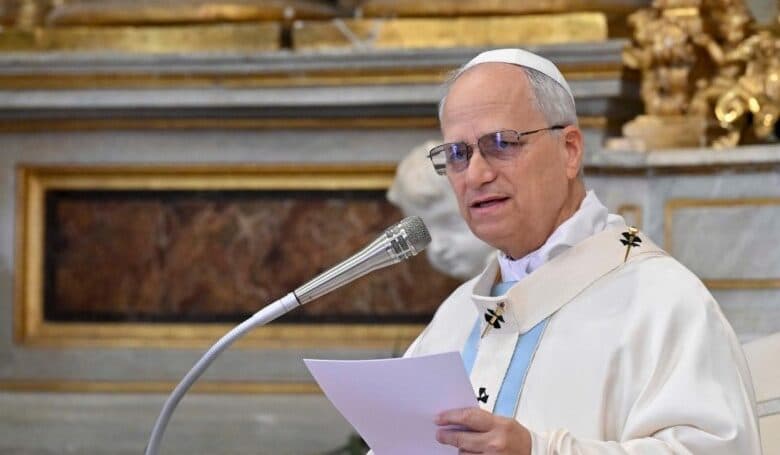Material comfort and a certain complacency can dull the conscience, Pope Leo XIV said during his homily for the Solemnity of the Assumption of Mary, the Mother of God.
The pope was at St. Thomas of Villanova Church in Castel Gandolfo on Aug. 15, and he noted that every human story, even that of the Mother of God, “is brief on this earth and comes to an end.”
“Yet nothing is lost. When a life ends, its uniqueness shines even more clearly. The Magnificat, which the Gospel places on the lips of the young Mary, now radiates the light of all her days. One single day — the day she met her cousin Elizabeth — contains the seed of every other day, of every other season. And words are not enough; a song is needed, one that continues to be sung in the Church ‘from generation to generation’, at the close of every day,” he said.
“The surprising fruitfulness of barren Elizabeth confirmed Mary in her trust; it anticipated the fruitfulness of her ‘yes,’ which extends to the fruitfulness of the Church and of all humanity whenever God’s renewing Word is welcomed. That day, two women met in faith, then stayed together for three months to support each other, not just in practical matters but in a new way of reading history,” Leo continued.
He told the congregation that the Resurrection enters the world even today, and while the words and choices of death may seem to prevail, “the life of God breaks through our despair through concrete experiences of fraternity and new gestures of solidarity.”
He spoke about the Gospel account of Mary meeting her cousin Elizabeth, when both were pregnant.
“Two women met in faith, then stayed together for three months to support each other, not just in practical matters but in a new way of reading history,” he said, referring to the Magnificat.
“Even in our own day, the poor and persecuted Christian communities, the witnesses of tenderness and forgiveness in places of conflict, and the peacemakers and bridge-builders in a broken world, are the joy of the Church,” Leo said.
“They are her enduring fruitfulness, the first fruits of the Kingdom to come. Many of them are women, like the elderly Elizabeth and the young Mary — Paschal women, apostles of the Resurrection. Let us be converted by their witness,” the pope continued.
He said when people “choose life”, they are right to see in Mary, “assumed into heaven, our own destiny.”
“She is given to us as the sign that the Resurrection of Jesus was no isolated event, no mere exception. In Christ, we, too, can ‘swallow up death’. To be sure, it is God’s work, not ours,” Leo continued.
“Yet Mary is that wondrous union of grace and freedom, which urges each of us to have trust, courage and participation in the life of God’s people,” he added.
“Let us not be afraid to choose life! It may seem risky and imprudent. Many voices whisper: ‘Why bother? Let it go. Think of your own interests.’ These are voices of death,” the pope explained. “But we are disciples of Christ. It is his love that drives us — soul and body — in our time. As individuals and as the Church, we no longer live for ourselves. This — and only this — spreads life and lets life prevail. Our victory over death begins here and now.”












